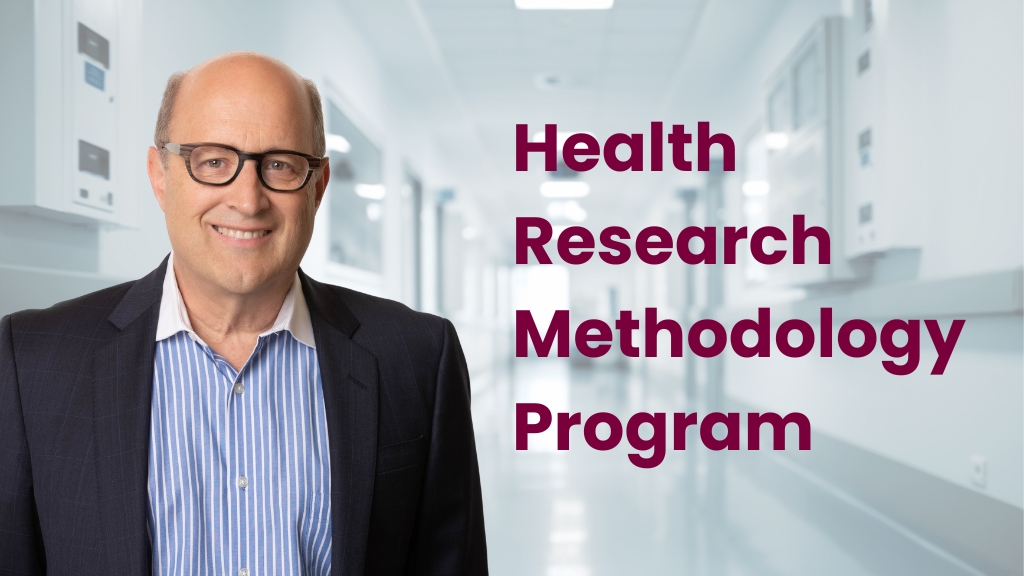Training the next generation of health professionals: Health Research Methodology (HRM) Program

McMaster University’s Department of Health Research Methods, Evidence, and Impact (HEI) is home to seven graduate programs including master’s degrees, doctoral degrees, and diplomas that all contribute to training the next generation of health researchers and professionals. In the series “Training the next generation of health professionals,” we’re highlighting each of our programs and all they have to offer.
The Health Research Methodology (HRM) Program offers training at both the master’s and doctoral degree levels. Its aim is to equip graduates with research methods skills enabling them to “push the boundaries of knowledge” in critical areas such as enhancing clinical practice, fortifying health systems, and promoting population health. Celebrating over five decades of excellence, HRM champions interdisciplinary collaboration, drawing on faculty expertise from various fields. At entry, HRM students have a broad spectrum of academic backgrounds that include medicine, nursing, rehabilitation sciences, social work, economics, math/stats, political science, sociology, geography, education, and psychology, bringing diverse perspectives, experiences, and expertise to the table.
“To be a good doctor and effectively practice Evidence-Based Medicine, I realized that having the skills to critically appraise evidence is crucial. The HRM program has empowered me to not only interpret evidence but also to generate and conduct methodologically sound studies. I am leaving this program not only with a new skillset, but with new connections and lifelong mentors who continue to inspire me and teach me everyday,” shared Leen Naji, a PhD candidate in the program.
Mitchell Levine, HEI Professor, is the Assistant Dean of the HRM program. We spoke with Levine about the program’s rich history and the opportunities it provides for students to make a meaningful difference in their careers.
The Health Research Methodology (HRM) Program was established in 1972. Can you provide insights into the program’s history and its evolution over the years?
The program was initially founded as the “Design Measurement and Evaluation” program, graduating its first master’s student in 1972. Its initial focus was to train healthcare practitioners on how to appraise and conduct health research. Since then, the program has grown to encompass other fields and disciplines, including educating students in health technology assessment and evidence synthesis. The program has also grown to offer both master’s and doctoral degrees. In 1997 the program changed its name to “Health Research Methodology.” Over the years, the program has continued to grow in both numbers and stature, becoming one of the largest graduate programs at McMaster University.
Can you elaborate on some of the unique features of the HRM program that differentiate it from other programs in the field?
What may differentiate this program from other graduate programs in health research is that its foundation is based on an appreciation of Evidence-Based Medicine and the hierarchy of research methods that generate health information. As a result, there is a strong drive for pursuing the best possible methods for answering a specific research question. Trainees are encouraged to apply their clinical or health related interests to their course projects and their thesis, strengthening the relevance of the methods training to their career interests. In its goals, HRM embodies a commitment to practical, community relevant research that is rigorous and makes a difference in people’s lives. The program’s pedagogical methods are experiential and problem-based, emphasizing learning-by-doing.
How do you perceive the importance of fostering a student body with diverse academic backgrounds and maintaining an interdisciplinary educational model within the program?
While graduate education starts inside the university, what students learn is intended to be applied in a diverse and complex world. Exposing students to colleagues with diverse academic backgrounds and being taught by interdisciplinary faculty prepares them for the real world, where they will apply their new knowledge.
Can you describe the career trajectories of HRM graduates and the recognition the program has received?
HRM graduates take up positions in academic medicine, university research, government, and industry. Several have founded new education programs elsewhere, based on their experiences in HRM. A previous review of HEI referred to the program as the “jewel in the crown” of the Faculty of Health Sciences.
To learn more about the program, visit the HRM website.
Programs